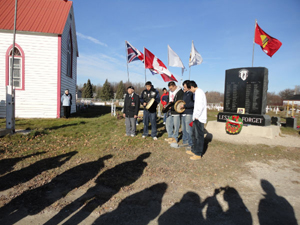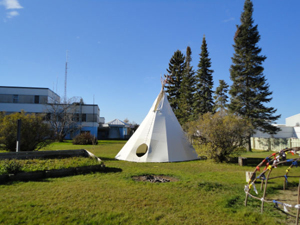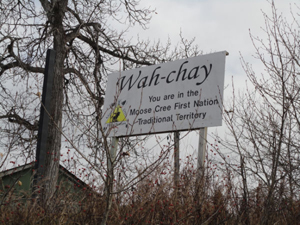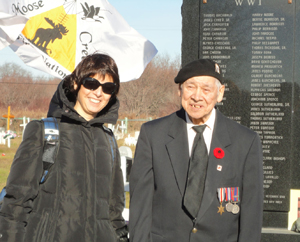 "Humble workers." That's the phrase Jim Skembaris, Manager, Addictions and Asian Mental Health Programs at TWH, continually returns to as he describes his recent experiences working in the remote Aboriginal communities of the James Bay region, as part of a UHN collaboration with the area's health services. "We went in as humble workers," he repeats.
"Humble workers." That's the phrase Jim Skembaris, Manager, Addictions and Asian Mental Health Programs at TWH, continually returns to as he describes his recent experiences working in the remote Aboriginal communities of the James Bay region, as part of a UHN collaboration with the area's health services. "We went in as humble workers," he repeats.
The collaboration started last June, when the Weeneebayko Hospital (now WAHA) contacted UHN, initially looking for help building capacity, but then needing urgent crisis support following a spate of cluster suicides. UHN already has a relationship with the area through Global Nursing, which established a collaborative program together several years ago. This time, the community was looking for support in mental health, addictions and traditional healing integration.
 So, last June, Skembaris travelled up to the remote northeast region of Ontario, along with Derek Strachan from Spiritual Care, and Krysia Theriault, Advance Practice Nurse Educator. UHN staff returned again in October, and plans are underway for another visit and establishing more permanent ties. Along with the initial group, Isabel Sales, another clinician, is also involved in the project. Over 100 frontline mental health and addictions, and community-based and traditional healing service providers across the James Bay Coast have received training sessions through UHN by now.
So, last June, Skembaris travelled up to the remote northeast region of Ontario, along with Derek Strachan from Spiritual Care, and Krysia Theriault, Advance Practice Nurse Educator. UHN staff returned again in October, and plans are underway for another visit and establishing more permanent ties. Along with the initial group, Isabel Sales, another clinician, is also involved in the project. Over 100 frontline mental health and addictions, and community-based and traditional healing service providers across the James Bay Coast have received training sessions through UHN by now.
The initial visit was the most challenging, and even, in Skembaris' words, overwhelming—making the leap from a downtown Toronto hospital into a remote Aboriginal community in crisis mode, without alienating people. The UHN group loosely mapped out some goals—to learn about the community, to assess their immediate and long-term needs, and to figure out how to facilitate interaction between the different agencies and the community. But they were also cognizant of letting the community drive the process.
 As a clinical educator, Theriault, and then later Sales, have worked on providing training sessions. Sales spent an entire month in the region, and was instrumental in bringing a practice perspective right to the frontline workers.
As a clinical educator, Theriault, and then later Sales, have worked on providing training sessions. Sales spent an entire month in the region, and was instrumental in bringing a practice perspective right to the frontline workers.
It will likely come as no surprise to anyone here at UHN that dealing with illness, whether physical, or as in this case, mental/spiritual, takes its toll on health care workers as much as on patients. This awareness drives a lot of programming at UHN, whether that's the staff work that is incorporated into Patient-Centre Care training, or the work-life balance goals of the Wellness Centre. And it's a philosophy Skembaris brought to this project too.
"Healing can't start until you start sharing your stories," he says, and in this case, it had to start with the caregivers (both hospital- and community-based). He was pleasantly surprised to find that people were very willing to open up and start talking about their experiences. Many people also met individually with Derek Strachan, the Spiritual Care advisor.
 Again, he returns to humility—"we went in as humble workers," he repeats. Faced with a community of which they had little knowledge, he realized that the best approach was to embrace that seeming disadvantage and turn it into being open about what they didn't know. Their constant refrain was "I'm not the expert, you're the expert. You tell me what you need."
Again, he returns to humility—"we went in as humble workers," he repeats. Faced with a community of which they had little knowledge, he realized that the best approach was to embrace that seeming disadvantage and turn it into being open about what they didn't know. Their constant refrain was "I'm not the expert, you're the expert. You tell me what you need."
Building trust was a crucial part of their work in that first visit. The challenge, he explains, was figuring out what they could feasibly accomplish—what could be practical, that would have an impact without being intrusive? Skembaris was moved to find that even just showing up went a long way to gaining trust: "'I'm here. I don't know a lot about your culture, but I'm here.' One of the things I could do is make it safe for them to start sharing their stories and start talking about what's going on…" Again, the refrain of humility, of not playing the all-knowing expert.
At some points, he felt he had nothing else to give other than the listening and being there. He really had to make it clear that they weren't pushing an agenda, and that moved the trust along. He also credits their willingness to walk around in the community as another factor in gaining trust and learning about the people.
"I thought that we wouldn't be as easily engaged by the people in the community… We walked a lot—we went into the community centres, we went on the reserve. And people talked to us," he says. While their efforts were directed at the health care workers and not the general population, that interaction was still a critical part of the trips' success. Even seemingly small things, like inviting community staff into their own homes for dinner, facilitated further dialogue and establishment of trust.
"It seemed to me that everybody had a story, and most of the people did want to talk," says Skembaris. "We were making it safe for them to share their story and to start the healing process a little bit."
They also debriefed amongst themselves every night, because they felt so overwhelmed and stressed by what they were hearing and seeing.
"Personally, for me, I felt a bit ashamed to be Canadian," says Skembaris. "Because I felt that not far from here, there are people that live in those kind of conditions—they can't get nutrition, they can't get good dental care. Prices were high. It was embarrassing, to be able to go 'Wow, we're talking Ontario and people have to struggle to that degree.'"
Their approach and attitudes turned out to be spot on, judging from the overwhelmingly positive feedback they've received.
"As a planner, I have found the UHN team to be a breath of fresh air. This work is definitely helping us to build capacity in the James Bay region. Your support is valued and very much appreciated," Gertie Mai Muise, Regional Health Planner, Weeneebayko Area Health Authority, wrote in an email immediately following the October visit.
